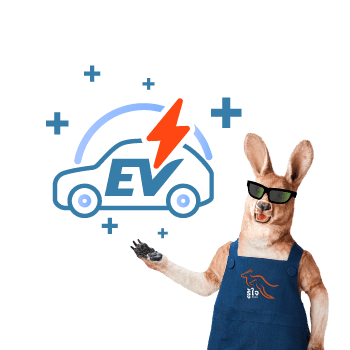EV car insurance in Thailand
Roojai EV car insurance offers affordable price, high sum insured. Protect your electric car and battery. Buy additional coverage for your electric car and wall charger. We have EV car insurance types 1, 2, and 3 with customizable plan. Choose the best EV car insurance Thailand to protect your loved electric car and peace of mind on every journey

Roojai EV car insurance offers affordable price, high sum insured. protect your electric car and battery. Buy additional coverage for your electric car and wall charger. We have EV car insurance types 1, 2, and 3 with customizable plan Choose the best EV car insurance Thailand to protect your loved electric car and peace of mind on every journey
What is electric car insurance with Roojai?
Electric car insurance is a specific product designed to protect electric vehicles. Specifically, this insurance product is a voluntary motor insurance policy, purchased to increase the coverage from the compulsory insurance.
EV car insurance is different from normal car insurance. The product covers electric car battery and electrical systems including electric wall charger. Therefore, the insurance premiums and conditions of Roojai EV insurance are different from normal car insurance. The electric car insurance at Roojai is designed for your confidence and safety while driving. This insurance product protects you from financial risk and unexpected events which might occur on the road.
How many types of EV car insurance?
Roojai provides insurance plans to cover your electric car as follows.
What does electric car insurance type 1 cover?
Roojai electric car insurance type 1 is suitable for beginners learning to drive, newly released cars, and all users of EV cars. This coverage includes EV battery and gives comprehensive protection for yourself and your electric with the following benefits:
- EV battery coverage
- Damages to your car (cover both collisions with a party and without a third party)
- Third party liability coverage for property damages, injuries, and death
- Damages to the windscreen
- Loss caused by theft
- Damages caused by fire
- Flood damages
- Medical expense coverage
- Personal accident coverage
- Bail bond coverage
What does electric car insurance type 2 cover?
Type 2 EV car insurance is ideal for people who want to save on insurance premiums while driving safely on the road. Be aware that EV insurance type 2 won’t pay for repairs to your own car.
However, this offers coverage for your battery EV in certain situations:
- Cover EV battery damages (In case of loss caused by theft and fire)
- Third party liability coverage for property damages, bodily injuries, and loss of life
- Car losses from theft and robbery.
- Fire
- Medical expense coverage
- Personal accident
- Bail bond coverage
What does electric car insurance type 3 cover?
Type 3 EV car insurance is the most affordable voluntary motor insurance product and has low insurance premiums with limited coverage. This EV insurance is best for drivers with a history of safe driving and a low risk of accidents. The insurance policy will not cover your electric vehicle battery. Here is what is included in the insurance type 3 coverage:
- Third party liability coverage for property damages, bodily injuries, and loss of life
- Medical expense coverage
- Personal accident
- Bail bond coverage
What is EV battery coverage?
EV battery coverage protects against damages to the battery caused by an accident.
This is included in EV car insurance type 1 and offers the most comprehensive coverage. On the other hand, type 2 insurance will cover the battery only if the car is lost/stolen or in the event of a fire, and a type 3 policy doesn't have battery coverage.
How important is the battery in an electric car?
Electric cars or EVs use electricity to move. That means the vehicle uses only electricity to run, without relying on gasoline like combustion-engine cars. The electric vehicle battery functions like a gas tank, storing electrical energy to propel the car. If the battery wears out, the car's efficiency will decrease. And if the battery is damaged in an accident, repairing it can be very expensive.
How is Roojai EV car battery coverage?
Having an insurance policy that covers the battery is crucial. Roojai EV insurance provides coverage for your battery functionality. If the battery is damaged to the extent that it needs to be replaced with a new one, the insurance company will cover the battery repair based the battery lifespan:
- For electric cars less than 1 year old, the policy will cover up to 100% of the price of a new battery.
- For electric cars under 2 years old, the policy will cover up to 90% of the price of a new battery.
- For electric cars under 3 years old, the policy will cover up to 80% of the price of a new battery.
- For electric cars under 4 years old, the policy will cover up to 70% of the price of a new battery.
- For electric cars under 5 years old, the policy will cover up to 60% of the price of a new battery.
- For electric cars over 5 years old, the policy will cover up to 50% of the price of a new battery.
Example
If a three-year-old electric car is involved in an accident and the damage is severe enough to require a battery replacement, the insurance company will cover 80% of the cost of a new battery, with the insured responsible for the remaining 20%.
What is the wall charger coverage?
The wall charger coverage protects you from the financial burden of having to repair or replace your EV wall charger if it is damaged while charging. It’s an additional coverage that can be purchased to increase your protection.
How important is the wall charger coverage?
The EV charger is a device that pulls the electrical current from the electric outlet or the electric grid and delivers electricity to the EV battery to recharge it of the electrical energy consumed from driving. There are many formats of EV chargers in Thailand, according to usage and needs. Most of those installed at home are normally wall mounted and prices range from 15,000 to 100,000 baht depending on the brand, its size and charging speed. However, the device and installation price does exclude the increase in meter size costs, wiring fees, and other expenses. That’s why having EV car insurance with additional charger coverage will provide you peace of mind and reduce financial risk in case of damage.
How does Roojai EV insurance protect EV wall chargers?
Roojai will protect the charging cable/electric battery charger at home. The wall charger is covered for accidents happened during charging. This will save you from repair or replacement expenses. You can choose to purchase additional coverage from Roojai website.
Compare EV car insurance types
There are 3 types of EV car insurance in Thailand, including type 1, type 2 and type 3.
For comprehensive coverage, we do recommend EV car insurance type 1 as it’s the most encompassing. You can find the details in the insurance type comparison table below:
| Coverage details | |||||
| EV car insurance | |||||
| Type 1 | Type 2 | Type 3 | |||
| EV Car coverage | |||||
| Battery coverage | |||||
| Wall charger coverage | Choose additional coverage | ||||
| Coverage for insured EV car | |||||
| Car damages – (collision with third party) | |||||
| Car damages – (collision without third party) | |||||
| Damages to the windscreen | |||||
| Theft | |||||
| Fire | |||||
| Flood | |||||
| Natural disaster | |||||
| Liability for third party | |||||
| Third party bodily injuries and loss of life | |||||
| Third party property damages | |||||
| Coverage for insured | |||||
| Medical expenses | |||||
| Personal accident | |||||
| Bail bond | |||||
Remarks
1. The battery coverage of type 2 insurance covers only loss/theft and fire.
2. Terms and conditions apply
How is electric car insurance different from car insurance?
Electric car insurance in Thailand is different from car insurance in many aspects, as it is a specific product designed together by the insurance companies and the Office of Insurance Commission. EV insurance provides coverage for damages to the EV battery and wall charger. The information required, the insurance premium and claim process are also different from regular car insurance.
1. EV battery coverage
EV car insurance provides coverage for the battery. which is not included in a normal car insurance policy. It covers damages to the battery, as a result of an accident. For example, if the EV battery gets damaged at a charging station or is subject to flood damage, the repair or replacement costs will be covered, according to the EV insurance coverage.
2. Wall charger coverage
Installing a wall charger at home is an extra expense. Having an insurance policy that protects you from damages to your charger will save you from stress if an accident occurs during charging.
3. Comprehensive coverage with high insurance premium
Certainly, electric car insurance premiums tend to be higher than normal car insurance. But the EV insurance product provides additional coverage, including EV battery. It can also cover your home wall charger. There are additional factors to consider such as the electric car prices in Thailand and the higher maintenance costs and repair costs for electric vehicles, which raise the premiums for EV insurance.
4. How different is the car repair and claim process for EV insurance?
When you make an insurance claim for electric cars the procedure might be a bit different. Firstly, the car must be inspected and certified by an EV car battery expert. Plus, any repairs must be done at a certified repair garage centre that meets the standards and where there trained specialist technicians. This process might take longer than when you claim for normal car insurance, because of the complexity of electric vehicles.
How much is electric car insurance?
Currently, there are many EV insurance brands in Thailand. Each offering has different prices and coverage details. The starting insurance premium for electric cars ranges from 5,183 to 26,317 baht, depending on the electric car brand and model, similarly to regular car insurance.
Here are the starting prices for EV insurance premiums:
|
|
|
|
|
|
|
|
Terms and conditions apply.
Why buying an EV insurance policy with Roojai?
- EV battery coverage up to 100%
- Offer additional coverage for wall charger.
- Repair warranty from the leading garage dealer network.
- Up to 5 named drivers.
- Add-on 24 hours roadside assistance
- Provide choice between insurance policy type 1, type 2 and type 3
- Cover car damages, driver, passengers and third party.
- Cover for EV battery damages, theft, fire, flood, and other natural disasters.
Does Roojai insurance policies allow you to select an excess?
The Roojai EV insurance policy allows you to choose an excess to reduce your premium. Choosing a higher excess lowers your premium. The excess is the amount you agree to pay if you are at fault in an accident while the insurance company will cover any claim cost over that amount.
For example:
- You purchase a policy with an excess of ฿ 3,000. If you make a insurance claim where you are at fault, you must cover for ฿3,000 and the insurance company pays the rest.
- If you are not at fault, the excess will not apply. The company will pay for all car repairs for you.
Choosing an excess helps you save on insurance premiums and it's best for agood drivers. It's not great for those who drive recklessly or frequently get into accidents.
Q&A EV insurance
What are the advantages and disadvantages of EVs you must know before buying insurance?
Of course, you must have your electric car before getting car insurance. There are attractive prices and offers from many brands. We suggest you look for information on both advantages and disadvantages of EV cars in Thailand.
Advantages - Helps reduce costs in the long run, especially gasoline, which price is increasing day by day. You can conveniently charge the EV battery at home or at charging stations. Moreover, driving is quiet since electric car are powered by batteries instead of a noisy combustion engine. The quietness has led to laws requiring synthetic engine sounds for safety. Finally, for those who are environmentally concerned, driving an electric vehicle reduces greenhouse gas emissions compared to using a traditional combustion engine car.
Disadvantages – It's currently unsuitable for people who drive long distances because electric charging stations in Thailand aren't available everywhere yet, especially in rural areas. You'll need to carefully planyour route to ensure there are enough charging stations along the way. If you install a wall charger at home, you'll need to wire it safely and ensure it doesn't overload your home's electrical system. You should think about installing an automatic cut-off to prevent electrical leaks, but all of this means additional expenses after buying an electric car.
How to maintain your EV battery?
Here are the tips to maintain the EV battery:
- Avoid charging daily as it strains the battery, which will decrease its storage capacity. Charge only when necessary.
- Do not let the battery drain to 0% as this increases its workload. causing faster deterioration.
- Avoid charging to 100% capacity because it can shorten battery lifespan. Aim to keep battery level within the optimal range of 20-80% charge.
- Try to park electric vehicle away from direct sunlight and avoid charging in high temperatures. This helps the battery's thermal management system function properly without excessive outside interference.
Avoid using the quick charge too often to charge your EV battery. Quick charging with DC current takes about 30-45 minutes and can charge the battery up to 80%. You can find this type of charge at EV charging stations, department stores, and gas stations, but it may impact the battery's lifespan. On the other hand, Normal charging involves AC current and is suitable for overnight charging at home or electric car charging stations. It works for all-electric car models and hybrid cars.
Is compulsory insurance necessary for EV cars in Thailand?
If you have an EV car in Thailand, it is necessary to purchase the compulsory insurance. According to the law, any vehicle propelled by engine, electric power, or other forms of energy must be insured.
Roojai customers can purchase compulsory insurance or Por Ror Bor from Roojai directly.
Who should insure electric cars?
Electric vehicle insurance is suitable for all-electric vehicle owners seeking extra protection compared to the compulsory insurance mandated by the law. EV insurance is designed to cover the car battery and has optional wall charger coverage.
What’s to consider when buying EV car insurance?
For EV car owners or those looking to purchase an EV car, we recommend type 1 insurance for full coverage from battery damages, windscreen damages, third-party damages, and car losses due to theft fire, and flood. If your car is involved in an accident and requires repairs, type 1 insurance is the best option for minimizing your expenses. But, if you are looking to save on insurance premiums, and don’t mind covering for your own car repairs and losses, EV car insurance types 2 and type 3 also cater to your needs.
What kind of car is protected by the Roojai EV insurance policy?
The Roojai electric car insurance policy covers only battery electric vehicles (BEV). For other cars that are not powered by electrical energy for propulsion such as a hybrid car (HEV), plug-in hybrid car (PHEV), and fuel cell electric vehicles (FCEV) or other types of vehicles that are looking for comprehensive coverage, you can get regular car insurance and get a quote online with Roojai.
What are the benefits of Roojai EV insurance?
Roojai electric car insurance is designed specifically for EVs, to protect you on every journey. Get a free quote for your preferred insurance plan without giving your contact information. You can also select additional services such as 24-hour roadside assistance.
Here are some of the benefits of Roojai insurance:
- Provide all types of EV car insurance coverage with customizable plans to meet your needs.
- Get a free your electric car insurance quote and buy online.
- Make a video car inspection through the Roojai mobile app
- 12-month warranty on car repairs by our dealer garages network nationwide
- Excellent customer service guarantee with a 4.9/5 review score
- 30-minute guarantee arrival to the accident scene or online claim via the Roojai mobile app
- Offer 10 monthly instalments via debit/credit card and PromptPay.
What is the online claim video call?
Make your video claim online using the Roojai Mobile App. In case your car has minor damage and you don't want to wait to meet our surveyor, you can claim immediately through the Roojai mobile app.
Roojai created a video claim system for Roojai customers, making the claim process quick, easy and convenient.. Guaranteed by claim satisfaction with a claim review score of 4.7/5.
Does EV car insurance have a driver plan?
The OIC regulation allows only the named driver plan for electric vehicle insurance, and up to 5 named drivers can be added to the policy.
Can I pay by instalments for an EV car insurance?
With Roojai, you have the option to pay for your insurance premium in 10 monthly instalments using credit/debit cards or PromptPay, or you can opt for an annual payment, depending on your financial planning and budget. Additionally, we offer a variety of payment channels, including credit/debit card, PromptPay, Rabbit Line Pay, TrueMoney, and mobile banking.
How to contact Roojai?
If you are interested in our electric car insurance products, please feel free to message us or contact our award-winning English Customer Service (02 080 9196) to check prices, buy EV car insurance, or make general inquiries.
Definitions:
| Named driver plan | The plan needs to specify everyone who will be driving the insured vehicle. The number of people will depend on the insurance policy. |
| Natural disaster | An event that occurs naturally and may cause damage to property or loss of life. |
| Hybrid car (HEV) | A hybrid car is a type of vehicle that combines two power sources, typically a combination of a gasoline engine and an electric motor, to propel the vehicle. |
| Plug-in hybrid car (PHEV) | A plug-in hybrid car, or PHEV, is a hybrid vehicle that combines a gasoline engine with an electric motor and a larger battery capacity compared to a HEV. Its battery can be charged by plugging it to an external electric power source. |
| Fuel cell electric vehicle (FCEV) | It's an electric vehicle utilizing fuel cells to convert energy into electricity without combustion, thus avoiding the creation of carbon dioxide. |
| Electric car charging station | Charging stations for electric vehicles, which provide electrical power to their batteries. Charging stations are categorized into two types: Normal Charge and Quick Charge. |
Terms and Conditions apply.
Updated Date 1st January 2025








